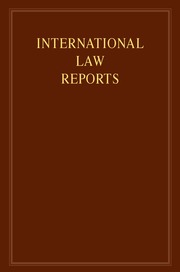No CrossRef data available.
Article contents
Territorial and Maritime Dispute between Nicaragua and Honduras in the Caribbean Sea
Published online by Cambridge University Press: 01 January 2021
Abstract
International Court of Justice — International maritime boundary delimitation between Nicaragua and Honduras — Dispute regarding boundary line dividing territorial sea, exclusive economic zone and continental shelf in the Caribbean Sea — Effect of islands — Sovereignty over islands
International Court of Justice — Admissibility — New claim introduced during proceedings — Whether new claim inherent in original claim
Treaties — Interpretation — Multilateral treaty — United Nations Convention on the Law of the Sea, 1982 (“UNCLOS”) — UNCLOS Articles 15, 74 and 83
Sea — Delimitation of maritime boundaries — Geographical context — Semi-enclosed sea — Territorial sea — Exclusive economic zone — Continental shelf — Governing law — UNCLOS — UNCLOS Articles 15, 74 and 83 — Establishment of single maritime boundary delimiting several coincident zones — Methods of delimitation — Whether equidistance/relevant circumstances approach suitable in light of circumstances — Relevant coasts — Identification of baselines — Bisector method of delimitation — Relevant geographical circumstances — Principle of uti possidetis juris — Whether applicable to delimitation of maritime space
Territory — Islands — Sovereignty over minor maritime features — Whether sovereignty established by post-colonial effectivités — Application of criteria formulated by Permanent Court of International Justice in Legal Status of Eastern Greenland case — Whether activities relied upon established overall pattern of conduct sufficient to demonstrate intention to act as sovereign
- Type
- Case Report
- Information
- Copyright
- © Cambridge University Press 2011




